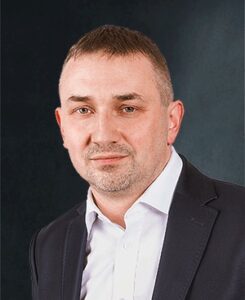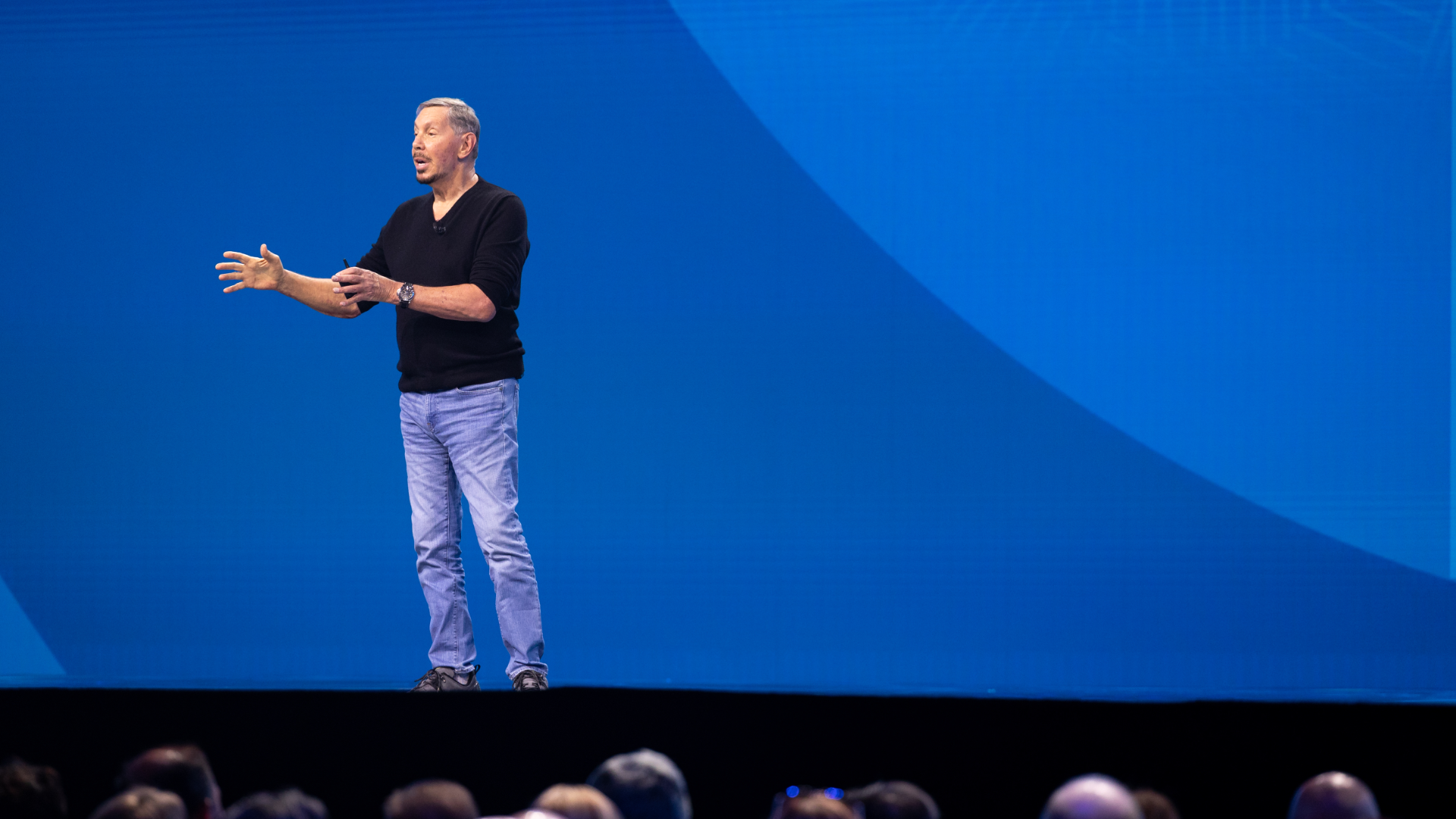Too little digital competence in public administration, the arduous digital transformation and Poland’s failure to keep up with EU regulations. On top of this, the technological problems arising in business, compounded by cyber threats – all this means that we need specialists more than ever. And here in Poland, a project straight from the West has emerged.
Dariusz Szostek, Ph.D., Professor at the University of Silesia, is blazing a trail for the effective and wise digitalisation of our country. He is not alone in this; he has involved NASK, Silesian universities and business partners, supported by the Cyfrowa Polska Association.
Below is an interview with Dariusz Szostek, Ph.D., in which he explains why it is so important to develop digital competences from an early age and what an effective digital transformation at the national level should look like.
At what point in the digital transformation are we currently in and what awaits us in the coming months and years?

Dariusz Szostek, PhD, Professor at the University of Silesia: The moment has been the same for 20 years – a breakthrough, because something new always appears (laughs). The breakthrough was the transformation in 2000 and in 2010. We have been moving forward all the time, but now we have another very serious breakthrough, where we have seen for about six months now that there is a complete acceleration of the digital transformation.
Let’s start by saying that we are in for a cold, or very cold, winter. Despite some governments conjuring up reality and saying that nothing bad will happen, there are governments that are already cutting back on gas and electricity consumption issues and secondly, making major investments related to the scope of the digital economy.
Printing, paper, traditional circulation is very expensive, so the European Union is developing Industry 4.0 and Digital Economy 3.0 very intensively. There are also very serious changes in administration, such as the automation of decision-making and the tokenisation of processes.
I have already mentioned on many occasions that a tsunami of new technology legislation is being prepared in the European Union. It is almost a thousand pages of new legislation concerning only new technologies. And in Poland we have a lot of catching up to do. The Union is already moving forward considerably, and at home, when I talk to any administrative body, they look at me as if I were a crazy professor.
Why is that? It’s the 21st century, you have to keep up, the whole world sees that digitalisation and cyber security are the cornerstones of our time. The Polish administration still doesn’t?
D. S.: For a simple reason – nobody looks at what is happening in the European Union, only at what is happening at home. There is a lack of competence and a lack of vision.
IT is functioning randomly, there are a lot of failed projects and no holistic view of anything. Of course, there are dozens of strategies, but has anyone seen them being implemented successively?
I recently analysed the German blockchain strategy, where it is written exactly in which month what law will be changed and what the consequences will be.
IT projects rely on the fact that there has to be a decent, multi-year and unified strategy. This is what Estonia, for example, has done, and it has never happened in our country and the consequences are striking. If only in the judiciary we have three IT systems serving the courts, how is this supposed to work?
And what are the biggest challenges?
D. S.: Let’s start by saying that tying it all together should not be done by any civil servants or administration at all. In the world, powerful companies are hired to do this kind of thing, they have the knowledge, this famous know how, they have the consultancy competence. These companies prepare all such strategy, while in our country it is prepared by officials.
If a document is prepared by a civil servant without the support of a company and professionals with the relevant knowledge and experience – well, it can’t work. All the more so because we should be looking ahead, not constantly playing catch-up.
We have specialists in Poland, but we underestimate them, so they are quickly courted by foreign companies. On the other hand, when we take a broader look at digital competences, this is very poor in Poland. What is the biggest problem here and what needs to change?
D. S.: Let’s start with primary schools. What does digital literacy look like there? My children laugh at the programmes their teachers have. In secondary school there is no workshop work of any kind, no collaborative projects, no start-up activities.
And on top of that we live in bubbles all the time, and in new technologies there is no bubble, it’s where everything comes together. The launch of Facebook or Tik Tok has had an impact on society. These are interconnected areas, the legal aspects, the technical aspects, you need to have a more general knowledge, and that’s not there.
I, as a lawyer, as I was preparing a monograph on blockchain I had to learn what blockchain is. My closest friends for the time of writing the monograph were computer scientists who showed me how to code, how to do it, until I understood it. And a lot of lawyers when describing new technologies describe the Yeti, they’ve never seen it but will describe it.
Why are they not taught computer science? In the West when you learn law you also have the basics of computer science, in turn in computer science you learn the basics of law. We need to take a more interdisciplinary approach. Until we start acting like in the West nothing will ever come of it.
There are many deficiencies in school. There is no decent education about entrepreneurship and finance, there is nothing about cyber security at a time when cyber attacks are steadily increasing….
D. S.: …37 per cent increase in cyber attacks this year compared to last.
Despite these figures, in Poland we generally notice the problem when it is already too late. It costs a lot, of course, but I think you have to understand that it pays off?
D. S.: These resources are there, let’s start with that. We have spent a huge amount of money on IT, but not on digitalisation. We are buying such quantities of – as they say colloquially – sheet metal that probably no country in Central and Eastern Europe buys so much.
Do we think hardware will take care of things? Are we not investing in systems and competence?
D. S.: Let me explain. When it comes to hardware, the matter is very simple, a public order, a tender and colloquially speaking we are covered, there is little risk of danger on the part of the ordering party. And when you are ordering an IT system, you have to know about it in order to receive it. To know what it is supposed to be, you have to design it first. And if the administration doesn’t know what it wants and in what direction it’s going to go, on top of that we have legislation that is disconnected from the digital environment, then we do everything to match the technology to the legislation, when it should be the other way around.
It is one thing to be in administration, one thing to be in education and one thing to be in business. Business is where it looks best and business is best secured in terms of cyber security.
And here we come back to digital competence. If when we walk down the street we don’t venture into dangerous places, why don’t we approach the digital world in the same way? Why the lack of understanding that education is important at every level, from primary school, earlier through parents and teachers, to university and adulthood?
D. S.: Over and over again. Let me give you an example – when we wanted to do activities ourselves at the school where my children study, we managed to do some activities on cyber security. But we also offered them to parents – one person came.
I am the practitioner. Together with NASK, the University of Silesia, the University of Economics and the Silesian University of Technology, and in cooperation with ZIPSEE, we will want to do mandatory cyber security training for Silesian students. We invite other universities to do the same.
Students come into their first year and in the 21st century they have library training, there is also administrative training and other basic training, such as health and safety, and there is no cyber security training. So we are changing that. Every student will have to have this training. The idea is to raise awareness.
The professor’s words highlight how much catching up we have to do. How do you go about popularising digital learning?
D. S.: The mentality needs to be changed. It’s a bit of a laugh that it was no coincidence that Moses walked across the Red Sea to the Promised Land until an entire generation died out.
Well, that is the sad truth, that there has to be a generational change?
D. S.: A little bit, yes, but I’m around fifty and am I old or modern? I don’t know. I’ll give an example of one venerable university, during the COVID-19 pandemic it was able to work electronically, and when we proposed an online postgraduate course, arguing that it was more convenient, that it gave the opportunity for students from all over Poland to attend, and that we would only organise the exercises on site, the conservative management was against it because “it’s against university ethics”.
Is digital education Teams? No, it’s just a tool. It’s not just the programmes, but also the methodology. Who can withstand 45 minutes or 1.5 hours of lecture? Research shows 18 minutes at most, so the methodology should be that 18 minutes and a break or interaction, not talking heads
This is why the idea of organising a Cyber Science study came up. The Professor is coordinating this project. It’s about breaking the ice and showing what to focus on, which way to go. Can you tell us more about the idea behind these studies?
D. S.: I am from a business background. The university is my workplace, but I’ve eaten my teeth for working in business and for technology companies, so I know what the biggest problem is – there are no human resources. The market looks like there is a shortage of specialists and everyone is buying up everyone. There was even a situation where a new bank came in and gave such rates that everyone moved there and there was no one to fill those holes.
Due to changes in EU directives, in two years’ time there will be even more critical infrastructure players, where we already have no specialists today, and we will need several thousand more. When I was talking to businesses and when everyone was complaining, I asked the question – who is going to produce these specialists? Let’s do it together.
As academics we will give the theoretical part and the basic knowledge, because it is needed, but we need real technical support and real postgraduate cases, so the idea came up to do it with partners. And that’s ZIPSEE, but also Samsung and Asseco, and that’s not everybody.
The classes will be in like 20-minute chunks. Listeners will get a package two weeks before the convention. Classes will be online, with practical exercises and networking on site. There will be a Samsung Day and an Asseco Day, where students will come to the company’s headquarters and have a case study all day – discussions on technology and problems to solve.
We are also betting on mixed competences, so some of the classes will be taught by the University of Technology, some by the University of Economics, some by the University of Silesia, and some will be led by NASK. There will be a legal scope package, there will be exercises in computer science, economists will tell us when it makes sense to use blockchain and when it doesn’t, and then the market will show us real applications.
We are taking not only academics, but also very serious practitioners. Not just people with academic degrees, but equally people without degrees, but with experience such that they are better than many a professor in their field.
Do you think this will transform the thinking of the general public, or at least the decision-makers?
D. S.: Let me say it straight away – no. We should have professionals among the decision-makers. The person who is supposed to manage the digital state must come from business and be someone who knows how to manage a digital business.
These studies are a start. We want to show that it is possible to do things differently. The scale is too small to change thinking in the general public. The support of our three universities is huge, but the approach to education has to change from traditional to modern and this has to become widespread. If we don’t change this then nothing will change, we will be some kind of island. And specialists will be immediately absorbed by external companies.
We are taking the first step and want to educate like Oxford, for example. That’s why our students at the 3-day congress will have to form a group – lawyers with IT specialists and with cyber security specialists. They will have to create a project and then defend it during a hackathon. There will also be partners on the committee and they will immediately verify who is the best.
So we will have more specialists, we believe the best, then what can we do to keep them with us, also in the administration? Money retains, but I guess that’s not the only thing?
D. S.: Money only retains at a certain stage of life and only the right money. It’s also about the comfort of the work and its ease. Again, let me give an example. Last year I was asked to come to the University of Silesia. There I have the full support of the administration, accountants, whoever. There, there is no such thing that there is a problem, and if there is, it is solved in a few hours. And I can only deal with substantive issues and I can do such studies.
Comfort of work, collaboration and openness to the new, rather than closure and fear of progress – that can keep a specialist.
So the hardliners need to be fought too?
D. S.: Let’s call it: conservative thinking.
From this it follows that in public administration you need not only specialists, but the right competence among those who will employ them. Can they be reached in any way? Do you first educate those who will later manage such an administration?
D. S.: The rulers must be open-minded and competent, but not afraid that a specialist is better than them. Let’s hire better than ourselves, because if we are better than someone, why hire them?
This should not be done in the local administration, it should be supported by an overall system, some kind of structure, not that each municipality to itself and each differently.
There has to be a big change here. What needs to be done is what was done before Poland joined the European Union, when people were taken to the West and shown that things could be done differently and they started to act like Western local governments. That’s why today Poland looks like the Netherlands did back then – sidewalks, ecology, festivals, cycle paths.
And when it comes to new technologies, you can ask in any office who has been to Estonia, Germany, who has looked at IT systems in, for example, England in the context of the digitisation of the judiciary. Nobody.
And who are these studies that you, Professor, are implementing for anyway?
D. S.: I always give the example of a well-known person in the technology community – who is Michal Jaworski, apart from being a member of Microsoft’s board of directors? A lawyer or a computer scientist? He has a lot of knowledge, he can discuss with me like a lawyer and with IT people from the technical side.
Therefore, with us, on the one hand, a lawyer will acquire at least the basics of IT, so that he can and will be able to talk to IT specialists. And on the other hand, the IT specialists who will manage the IT teams must have this legal knowledge. What the regulations are, what they will be, what are trusted services, what is a qualified signature and what is a regular signature, and then they will be able to advise the client on what to put in place.
However, these are courses for anyone thinking about cyber security or tokenisation. A university degree is the only requirement to join the course. Places are already running out, but it is possible that we will start another group, so you are warmly welcome.
Closing our conversation with a buckle, what would you like to pass on to potential students?
D. S.: Let me put it this way. If you want to be educated according to the classical scheme – go to another university. If you want to educate yourself in an unconventional and modern way about what will be and not what was, come to us.












